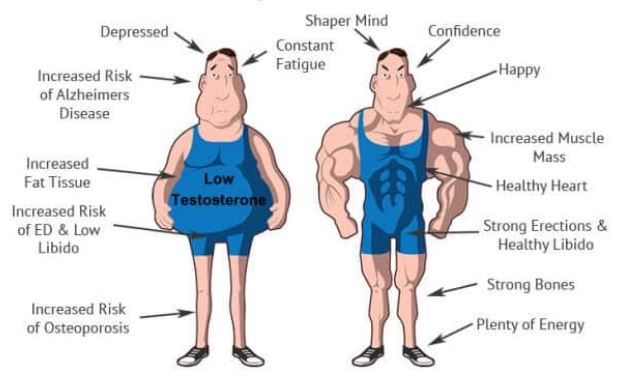Testosterone Replacement Therapy (TRT) has become a buzzword in the world of men’s health, and for good reason. As more men discover the potential benefits of restoring testosterone to healthy levels, TRT is gaining widespread attention. But what exactly is TRT, and how can it impact overall well-being? This blog will break down the essentials of testosterone replacement therapy, including its benefits, risks, and how to know if it’s right for you.
What is Testosterone Replacement Therapy (TRT)?
Testosterone is a crucial hormone in the human body, especially in men. It plays a key role in muscle mass, bone density, red blood cell production, and sexual health. As men age, their testosterone levels naturally decline—usually starting around the age of 30. Some experience more drastic drops, leading to symptoms such as fatigue, low libido, weight gain, depression, and cognitive issues. This condition, known as hypogonadism, can severely impact quality of life. TRT involves supplementing the body with synthetic or bioidentical testosterone to bring hormone levels back to an optimal range. This therapy can be administered in various forms such as injections, gels, patches, or pellets.
The Benefits of TRT
1. Increased Energy and Vitality
- Low testosterone can lead to chronic fatigue and decreased stamina. One of the most noticeable benefits of TRT is a significant boost in energy levels, making everyday tasks feel less exhausting.
2. Improved Mood and Mental Health
- Depression, irritability, and anxiety are common symptoms of low testosterone. TRT has been shown to improve mood stability and cognitive function, helping men feel more mentally sharp and emotionally balanced.
3. Enhanced Libido and Sexual Function
- Testosterone plays a direct role in sexual desire and performance. Many men on TRT report improved libido, better sexual satisfaction, and stronger erections.
4. Muscle Mass and Strength Gains
- Testosterone supports muscle growth and fat loss. By restoring optimal levels, TRT can help increase lean muscle mass, reduce body fat, and enhance strength, especially when combined with a good exercise routine.
5. Bone Health
- Low testosterone is associated with reduced bone density, increasing the risk of osteoporosis. TRT can help maintain strong bones, reducing the likelihood of fractures as you age.
6. Improved Heart Health
- There is evidence that TRT may have a positive impact on cardiovascular health by increasing red blood cell production and improving cholesterol profiles. However, this remains a debated topic among experts.
Who Can Benefit from TRT?
TRT is primarily recommended for men diagnosed with low testosterone levels and exhibiting symptoms of hypogonadism. Some common signs include:
• Chronic fatigue
• Low sex drive
• Difficulty concentrating
• Increased body fat, especially around the abdomen
• Reduced muscle mass
• Depressed mood or irritability
• Hair loss
It’s essential to consult with a healthcare provider to determine if TRT is appropriate. A simple blood test measuring testosterone levels can help establish whether you’re a candidate.
Risks and Side Effects
While TRT can provide numerous benefits, it’s not without risks. Some potential side effects include:
• Acne and oily skin: Increased testosterone can lead to higher oil production in the skin, causing breakouts.
• Sleep apnea: TRT can worsen existing sleep apnea, a condition where breathing stops temporarily during sleep.
• Increased red blood cell count: This can lead to polycythemia, a condition where the blood becomes too thick, raising the risk of blood clots.
• Fertility Issues: TRT can reduce sperm production, which may lead to infertility. Men wishing to have children should consider this carefully before starting TRT.
• Prostate Health: While there’s no definitive link between TRT and prostate cancer, men with a history of prostate issues should consult their doctor before beginning therapy.
The Different Types of TRT
There are various delivery methods for testosterone replacement therapy, and each has its pros and cons: • Injections Administered directly into the muscle, injections are one of the most common and effective methods. Typically, they’re given every 1-2 weeks.
• Transdermal Patches and Gels: These options are applied daily to the skin, allowing testosterone to be absorbed through the skin into the bloodstream. They’re convenient but can sometimes cause skin irritation.
• Testosterone Pellets: Small pellets are implanted under the skin, slowly releasing testosterone over several months. This method provides a steady hormone release but requires minor surgery.
• Oral Testosterone: Though less common, oral testosterone options are available. However, they’re not typically recommended due to potential liver damage risks.
TRT and Lifestyle Changes
TRT can work wonders, but it’s most effective when paired with a healthy lifestyle. If you’re considering testosterone replacement therapy, it’s important to also focus on:
• Exercise: Strength training and cardiovascular exercises can help amplify the benefits of TRT, particularly in boosting muscle mass and reducing fat.
• Diet: Eating a balanced diet rich in lean proteins, healthy fats, and vegetables supports hormone balance and overall health.
• Sleep: Proper rest is crucial for maintaining hormonal balance. Aim for 7-9 hours of quality sleep per night.
• Stress Management: Chronic stress can lower testosterone levels. Incorporating stress-reduction techniques like meditation, yoga, or mindfulness can enhance TRT’s effectiveness.
Conclusion
Testosterone Replacement Therapy can be life-changing for men suffering from low testosterone levels, offering benefits that range from improved mood and energy to better sexual health. However, it’s essential to weigh the pros and cons, discuss your options with a qualified healthcare provider, and monitor your progress carefully throughout the process. TRT is not a one-size-fits-all solution, but when done correctly, it can help you reclaim your vitality and live a healthier, more balanced life.
If you think you might benefit from TRT, schedule a consultation with Vital Hydration to explore your options and find the right treatment for you.
By addressing both the benefits and risks, this blog provides a comprehensive overview of testosterone replacement therapy to help readers make informed decisions about their health.


Be the first to comment